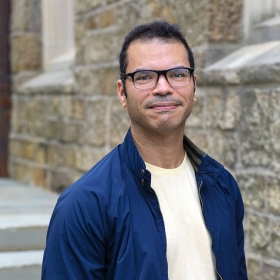Assistant Professor of English Octavio González on his new book on modernist novelists, teaching the Harlem Renaissance, and his other writing projects, including an ekphrastic autobiographical nonfiction memoir.

Photo by Lisa Abitbol
Assistant Professor of English Octavio González had a manuscript deadline looming when we caught up with him in Founders Hall last summer.
Tell us about your new book.
It will be in the modernism series at Penn State Press. It’s a monograph on four different modernist novelists. Two are British—Jean Rhys and Christopher Isherwood. Then I have Wallace Thurman and Nella Larsen from the Harlem Renaissance, two black American writers. The title is Misfit Modernism, so it’s on the trope of the misfit in the modern novel, and a very specific turning of that trope toward what we call today identity, or intersectionality. Someone like Rhys is a great example, because she wrote about Caribbean versus British and famously rewrote Jane Eyre in Wide Sargasso Sea.
Your Harlem Renaissance class is fully booked for the fall semester.
It is. It’s cross-listed in English and Africana studies. I love teaching that class. I developed it a few years ago, and it’s evolved. I’ve been trying to include more women authors, and some less known, like Marita Bonner, who’s not a household name. I still have Langston Hughes, his first collection of poetry. I still have James Weldon Johnson, The Autobiography of an Ex-Colored Man. So I have some greatest hits, as well as the novels of Nella Larsen, which are considered some of the most distinguished of the time.
What else are you working on?
I have three different creative writing projects. One is a poetry collection, a sequence of sonnets. It’s a crown of sonnets, a set of seven in which the last line of the last sonnet is the first line of the first sonnet, and so on. They’re interlocking. The second is an autobiographical nonfiction memoir that’s ekphrastic. The practice for that is looking at family photos and writing descriptions thereof. I have one piece that recently came out in the Latino Book Review, which includes the actual photograph. It’s an old Polaroid of me and my family taking a vacation in Puerto Plata, which is where I’m from in Santo Domingo. The third project is another kind of autobiographical practice that is a dramatic form. It’s called Q&A. It’s a poem in dramatic form with two speakers, Q and A. And the punch line is, at the end of Act One you realize that the two speakers are really one person. Those are the three. I work very slowly, though, because the scholarship has to come first.